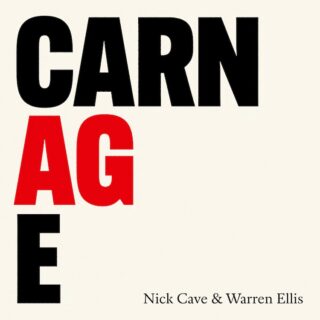Nick Cave and Warren Ellis
Carnage
(Goliath)
9/10

(Goliath)
9/10
Grief. Mourning. More specifically, lamenting the loss of someone you never knew. A weird one. A lot of us have spent the last year in mourning, and quite often mourning for people we’ve never met. The Herculean cricket score of the government’s Covid murder count lingers in the foreground of the news constantly, whilst the only new news is a constant string of beloved celebrity deaths.
We’ve had our fair share of grief for those we never knew over the last twelve months, heroes and icons from all walks of life are simply no more. Perhaps the one that got me the most was the loss of Diego Armando Maradona, who died on November 25th aged 60, and that evening it felt so right to listen to 2016’s Skeleton Tree in the dark, on my own.
On the surface, Nick Cave and Diego Maradona aren’t particularly comparable figures. Indeed, in no distinctive quality are they alike, but to me as titans of their discipline they are one and the same. It is not the content of their art, but the fires they ignite in their followers which spiritually entwines the pair. In this world there are simply heroes, figures whose brilliance in a discipline reaches total transcendence, and heroes Maradona and Cave certainly are.
On the night of el Diego’s passing, those whose lives he touched, in Buenos Aires and Naples, lined the streets for days, crying and singing and laying all manner of tributes; murals, shrines, tifos, etc. The pictures from Argentina and Southern Italy were among the most moving examples of people coming together to grieve in public, since, well…
Last time I saw Nick Cave live, he invited hundreds of devotees onto the stage to share ‘Push the Sky Away’ with him, at the very crescendo of his set. Since the tragic passing of his son Arthur, this has become a trademark of his live shows; pure catharsis through the sharing of fleeting euphoric moments. It wouldn’t be an understatement to say that the explorations of loss on his last two albums are among the most profound and visceral ever artistically conceived. I would go so far as to say that the heart-wrenching secondhand grief that has been granted to me by Skeleton Tree and Ghosteen the last five years has been among the realest mourning and loss I have ever felt.
It is extremely fitting then, be it deliberate or not, that Nick Cave’s lockdown album Carnage begins with shaking opus ‘Hand of God’, the go-to phrase oft-used not just to describe Maradona’s most famous goal, but his eternal “a little bit of cheating and a lot of genius” character. Cave’s lyrics are abstract, and delivered with a renewed urgency atop Ellis’ pulsing soundscapes and tides of sonic hubris.
Cave is rarely talked about as someone whose music is markedly current, informed more by his own vacuum and his own imagined worlds than it is by current events. But over the past year, few albums have felt as perfect for the moment as Ghosteen or Skeleton Tree. It is unsurprising then, that Cave’s reaction to the unrelenting bleakness of the world around him is to create, and do so poetically with visionary poignance.
Indeed, Carnage is shaped heavily by the two albums that have preceded it, but does perhaps see the Australian beginning to move in a new direction. Clearly divided at the midpoint, the first half sounds much unlike Cave’s entire oeuvre, before a stirring second half echoes back to Ghosteen and Push the Sky Away, with its ambient instrumentation and often-spoken vocals. There are bits of everything on Carnage, a taste of everything that the Australian raconteur has had to offer over a storied career.
An undoubted highlight from the first half is ‘White Elephant’, an absurdist stomp in dub that sees Cave proclaiming “I am a Botticelli Venus with a penis riding an enormous scalloped fan”. A highly brooding number, he caws “I’ll shoot you in the fucking face / If you think of coming round here” in a deadpan modernisation of his Murder Ballads; after hearing the tumult and heartbreak of his recent work, a return to this persona is like pulling on an old favourite sweater.
Given the global circumstances, though, the occasionally languid and always beautiful quartet that make up the second side feel pretty pertinent. ‘Albuquerque’ has echoes of ‘Distant Sky’, as Cave laments on his own difficulties of living without travelling. After all, those post-Skeleton Tree live shows always felt like his all-powerful coping mechanism – “We won’t go anywhere darling, anytime this year” hits pretty hard.
‘Lavender Fields’ and ‘Shattered Ground’ are wilting and ambient in their timbre, very much in the lineage of Ghosteen with their references to “the kingdom in the sky” and Cave’s painterly lyrics. The closer ‘Balcony Man’ is a slouched-over-the-piano number, that lights up with optimism, and ends with a repeated chorus of “This morning’s amazing and so are you”. Indeed, the despair of Skeleton Tree and Ghosteen is largely replaced by forlorn musings that are coloured with hope and optimism.
Carnage is another chapter in the book of an artist that has given so much over the last four decades. After spending the latter half of the 2010s confiding in his audience, sharing his grief and loss through some truly special albums, Nick Cave’s latest record offers escapism and consolation to us all after a year of constant grieving. As lockdown stretches out eternal, the timing is perfect; once more through our lives, Nick Cave is one step ahead with the perfect music for now.